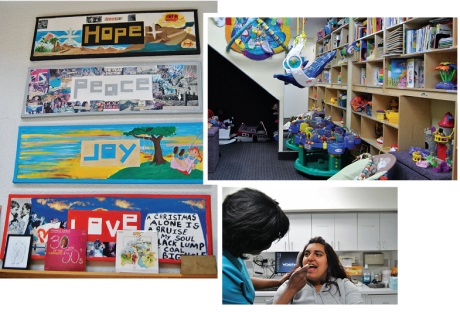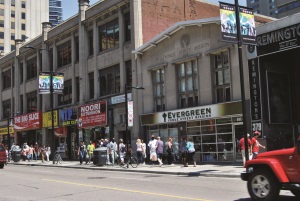On a tough strip of Yonge Street near a series of adult entertainment parlours, Maria found her way out of a lifestyle filled with uncertainty, street drugs and prostitution.
She had walked past Evergreen—a ministry within the Yonge Street Mission, which is supported by the Presbyterian Church—many times.
One day, she walked in.
She found hope, help and the way to new life.
“I came in one day. It was so welcoming,” she said of the open space filled not only with natural light, but with the light of those who bring Christ’s message to the burdened youth who have turned to live on the streets—or just off of them—in downtown Toronto.
The Yonge Street Mission, an independent Christian charity, began in 1896 as a gospel wagon. This was a way to reach those in need with God’s good news, grace and goodness as staff and volunteers sought to help them turn their lives around. As Toronto has grown and changed, so have the needs of its poor and marginalized people. In 1962, the youth centre opened.
The 1970s were an era of growth for the youth centre. The leading edge of the baby boomers and those attracted to an alternative lifestyle, with its drugs and sex, found themselves flocking to the bright lights of downtown Toronto. The centre began as a way to help them find jobs. In 1979, it was renamed Evergreen. The recession of the late 1980s and early 1990s hit and many young people saw opportunity evaporate.
Evergreen expanded to meet the needs of teens and young adults who had looked to eke out a living on the streets.
At 13, Maria became a ward of the state. The Children’s Aid Society didn’t give her what she needed to thrive. “When I first was taken away from my family, I was running away. I was scared. I had seen things I’d never seen before. I saw needles, people doing drugs,” she recalled.
“It’s hard to adjust and adapt when you’re in a group of strangers.”
She ran from foster home to foster home. At 17, she moved out and found a shelter in Parkdale, then her own apartment in the notorious Jane and Finch area.
The years of fighting to survive without her emotional needs being met translated into mental health issues.
“I stopped taking my medication. I got involved with the wrong people. I got into substance abuse. I was forced into prostitution.”
Evergreen offered her sanctuary.
A series of murals made the message even clearer. “Hope. Peace. Joy. Love.”
Its humble doors opened onto the neighbourhood she knew, but those doors also opened to a bright space, filled with light. Its walls showcased art other teens had made and, of course, there were tables where she could be nourished—whether with a hot lunch or dinner with someone who listened, who truly wanted to hear her story and help her write a different ending.

of the spirit; an area for the children of young parents; and a
young woman gets her teeth checked in the dental clinic.
The 25 staff and more than 60 volunteers—from the art therapy leaders to the clinic co-ordinator and a registered nurse, to executive director Gail Meats—opened their hearts and their minds to help her.
The warm welcome starts with a hot meal and some friendly conversation as staff encourage first-timers and regulars to share what’s going on in their lives. They help each one find the services that would help them, whether it’s an art therapy group, a young parents’ program, a visit to the health clinic or a more specialized program to deal with getting out of the sex trade.
“We see our role as being hope carriers. When they struggle to be hopeful, we carry their hope,” said Meats.
“Kids say they come to Evergreen because it’s where they’re loved unconditionally, where staff treat them as a whole person. They may want to talk about spiritual things or tell us about their struggles.
Evergreen is a place of rest, safety, away from the violence of their lives.”
It also recognizes they may have been missing out on the fun many Canadian teens and young adults take for granted. “We’ll have picnics and take them to the Ontario Science Centre and Toronto Island,” said Meats.
Some may want to return to school and Evergreen helps them find their way academically and socially, to get on a new track to enjoying their high school years and then onto graduation. Evergreen offers tutoring and educational and job counselling. It partners with George Brown College, Ryerson University and the University of Toronto, to find new pathways for the youth who have been excluded, to give them a taste of post-secondary learning, something they had never dreamed or imagined for themselves.
“Our role is one of a coach, of helping someone reach a goal,” said Meats. “What keeps me going personally is the potential I see in our young people. God gives us glimpses of them, their strength, their tenacity, their survival skills. They touch us with their amazing stories.”
Teens who turned to Evergreen put their hands together to make another mural in the art therapy program: “Healing hands echo in eternity.”
The clinic of Ruth Ewert, a registered nurse, was the beginning of the journey to healing.
“God started [the clinic] really. He was my hands and my brains,” said Ewert. “Fifty-six per cent of our youth are parents without children. When we’re involved, only 14 per cent lose their children to the Children’s Aid Society.” She helps the young parents break the cycle of abandonment and fear. She sets them on a path to becoming responsible for not only themselves but for their children.
“The parents are young. For the most part, they never had good role models. They’re homeless and they’re street involved. Sometimes they have mental health issues and addictions.”

The clinic offers straight talk and information on an array of issues: pamphlets on crack cocaine, Oxycontin, street methadone, Hepatitis C and sexually transmitted diseases line the waiting room wall.
“Although they’re in this for their child, as noble as that is, they’re as loving as anyone, they cannot provide the physical and emotional [supports].”
Ewert, however, recognizes their quest to give and to find love, as many young women become pregnant again to have a child who will love them unconditionally.
“A few days ago, a woman gave birth and she knew from the outset she had a very small chance of keeping her baby. She had mental health issues and developmental issues. Some people have lost previous children to the Children’s Aid Society. You’re kind of marked.”
They live stuck in a hopeless cycle. “The cycle of loss and horror continues until they go underground. They may go to another province. It’s a bad situation for everybody.”
Evergreen offers parenting classes. As an incentive beyond being able to keep their children, Evergreen offers gift certificates for groceries and clothes.
The class creates a place where friendships can be made and as they realize they’re not alone, participants support and encourage each other to carry on, even while the journey remains rough.
“One mom lost her home last week, so she’s shacked up with another girl, her boyfriend and their kids,” Ewert said. Accustomed to fighting to survive alone, they build their natural support networks.
The clinic also offers the basics of health and dental care, with nurses, a doctor, dentist, dental hygienist, Chinese medicine practitioner, naturopath and chiropractor. There’s also foot care, essential for those who fill their days walking the streets.
There’s also a baby food bank and an identification clinic. Many teens and young adults on the run lose their ID and can’t access social services or public programs. They may have no health card, which can cut them off from hospital care.
“One young woman was 40 weeks pregnant and she was labouring. She walked to three different hospitals because they didn’t want to take the risk of accepting someone with no history,” Ewert said.
It’s a sad reflection on Canada; a reality many Canadians would rather not face. According to a 2007 UNICEF study, Canada ranks 12th out of 21 rich nations when it comes to child welfare; and it is among the bottom few in the categories called, “Family and peer relationships” and “Behaviour and risks.” Child poverty is not an issue that’s been well addressed, Ewert said.
“They remain in poverty for the rest of their lives. Their education suffers because they move so often.”
Each day presents new opportunities but also new struggles.
“Moving away from street life is not a straight line,” said Ewert. “You can self-sabotage. They may be about to graduate to working and they stop believing in themselves.”
Maria found family, love and hope at Evergreen. A young woman who faced physical and emotional health struggles, Maria was raped at age 13 and diagnosed at 17 with bipolar disorder and schizophrenia.
Today she has found the mental, physical and spiritual strength to raise her infant son.
“We are all one under the Son,” declares one of the banners.
She also found Jesus Christ. “I consider the staff to be my family, not by blood but by relationship and what they’re willing to do. When you’re upset and crying, they hold your hand and not judge you,” she said.
She has obtained her high school diploma and has some good work history. She was accepted into college, but she put that on hold to have her baby.
She shares her strength at Evergreen, too. She helps Evergreen participants with their resumes.
“When your life has been broke, it’s hard to piece it back together yourself, because you can’t see the whole picture. Love conquers all. I truly believe that,” Maria said.
“When you inject love into the lives of people who are encircled in darkness, it makes a much bigger difference.”
